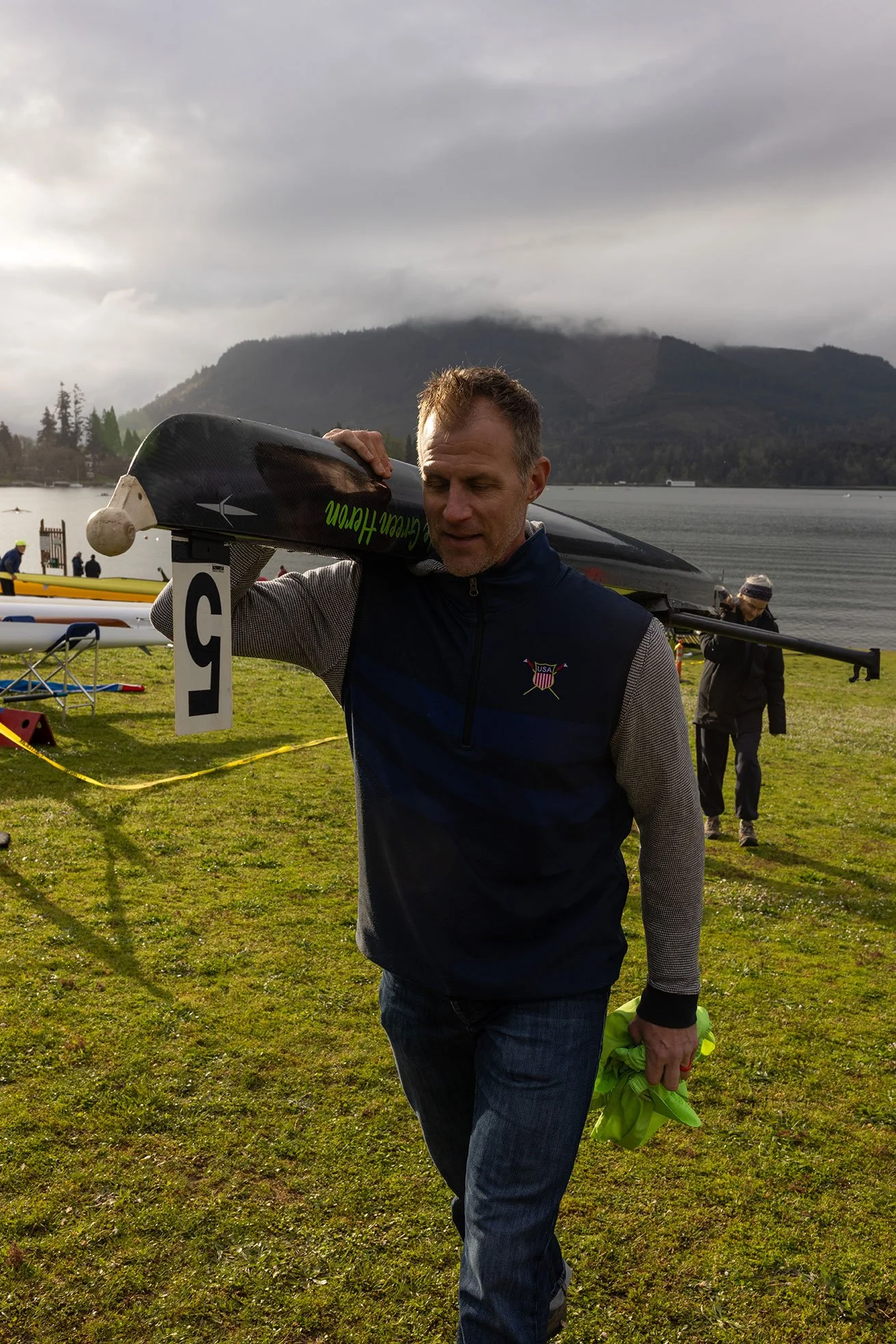
Against the
current
Paralympic Rower Todd vogt faces an uncertain future
in the sport that defines his identity.
Story by Riley Fox
Video and Photo by Miles Cull and Lucas Carroll
Had he not been diagnosed with young-onset Parkinson’s Disease, Todd Vogt might still be a good rower, but he wouldn’t have become a world-class professional athlete.
Vogt arrives at Portland Boat Club just as the sun peaks over the horizon. He brushes his teeth, then makes a cup of coffee as the soft morning light leaks into the boathouse. He trades his coffee for exercise bands and joins his friends in their warm-up.
After a round of stretching and rowing gossip, Vogt moves to the rowing machine and begins his training. At first, he’s stiff — his left hand curls awkwardly around the handle. As the minutes pass, the strokes grow smoother, more deliberate. Sweat beads at his temple, dampening his dirty blond hair where it grays at the edges. His eyes stay locked on the small screen, tracking each pull. The only recognizable sounds are the machine's soft whoosh and his steady, forceful breathing.
Some days, when the tremors are worse and the exhaustion lingers longer, Vogt wonders: Would he trade it all — the championships, the medals, the recognition — for a body that worked the way it used to? His answer changes, sometimes by the hour.
It all started with a flyer outside his freshman dorm at the University of Buffalo. It advertised joining the rowing team to get fit and make friends, so he thought, “Why not?”
After rowing for six miles, Todd Vogt continues to workout on his rowing machine in the boat club
boathouse, training for another 45 minutes.
What hooked Vogt was the video the coach showed at the team’s informational meeting. The rowers’ oars sliced through the water in unison and the athletes gasped for air as they crossed the finish line.
Vogt’s takeaway was not that he wanted to get exceptionally fit or muscular, nor the team dynamic, but the deep exhaustion the rowers went through.
"I remember thinking to myself, ‘That looks fun. If that’s a part of this sport — pushing yourself really physically hard, I can do that,’” Vogt said.
He didn’t just want to row. He wanted to push himself to the limit.
“I got the sense that the sport depended on how hard you work and if you're able to push yourself physically hard — if you could endure pain,” Vogt said. “If hurting yourself is part of the sport, I could hurt myself.”
Vogt continued to row with the team for the rest of his college career. He graduated with a bachelor’s in biochemistry and then went on to get a master’s in the same subject. He moved to Portland, where he became a senior research assistant at Oregon Health & Science University.
Vogt attempted to make the national team, but despite rowing competitively after college, he couldn’t balance working and training in a way that allowed him to reach that goal.
After nine years, Vogt quit his job in biochemical research at OHSU to become a rowing coach, allowing him to put all his time and energy into the sport.
Vogt was diagnosed with early-onset Parkinson’s at 43 years old, while coaching in Lake Oswego.
“Upon diagnosis, one first thought was how is this going to impact my relationship with Heather [his wife]?" Vogt said.
He worried she may have to become a caretaker for him.
“That kind of changed my entire life trajectory. I didn't know where my life was going to go at that point,” he said.
Parkinson's disease is a movement disorder of the nervous system that progressively worsens over time. It can cause shaking, stiff muscles, slow movements and balance problems.
There is currently no cure.
When his symptoms flare, Vogt’s left arm trembles alongside his hand. He might bounce slightly in his seat or shift his posture — subtle adjustments in an effort to keep control.
“When I first wake up, my tremor in my left hand is pretty violent, and I take medication as soon as I get up. It takes about half an hour to kick in,” he said.
When the medication isn’t working, the whole left side of Vogt’s body locks up and his tremor becomes more noticeable.
Parkinson's presents a variety of symptoms depending on the person. “I don't have a lot of cognitive issues,” he said. “A lot of people will have speech issues. I can still talk pretty well, and I'll be coming up on six years from diagnosis this summer.”
Vogt starts his early morning routine in Portland, Ore. After making his breakfast of coffee and a protein shake, Vogt gets on the road to arrive at the Portland Boat Club by 8 a.m. In college, he would leave for practice at the same time that one of his roommates would go to bed.
“At some point, after the diagnosis, I had this idea in my head; ‘well, what's this whole Paralympic rowing thing all about?’” he said. “I thought to myself, ‘what's it take to make the Paralympic national team?’”
Vogt started researching whether competing as an adaptive athlete was possible for him. Based on his symptoms, he would be classified as a PR3 Paralympic rower, formerly known as Legs, Trunk, and Arms.
PR3 is a para-rowing class for athletes with physical or visual impairments, including limb loss, muscle weakness or coordination issues. They have movement in their legs, torso and arms. Other classes include PR2 — those with upper body movement, but little to no leg mobility, and PR1: athletes with minimal to no torso and leg movement.
Vogt realized he could compete among other adaptive athletes, if not beat them. He went from being a good rower to an elite rower in a new category.
“I found all the times for a lot of international and U.S. Paralympic rowers. My speed was within the range of all these people,” he said. “I was like, ‘Whoa, I can classify, and I think I'm as fast, if not faster than some guys. Maybe this is the thing I can actually do.’”
Vogt climbed the ladder from national contender to international competitor — a level he never imagined reaching. Though he would’ve been content if none of this had ever happened, the diagnosis that changed his life also reshaped it. What once felt out of reach is now his reality: competing against the world’s best.
“I'm almost certain where I'd be if I were never diagnosed,” Vogt said. “I'd be exactly where I planned for my life to go. I was a full-time rowing coach. That's where I saw myself going — climbing the hierarchy of the rowing and coaching world and just having fun doing some races here and there.”
In the winter of 2018-19, Vogt began to take his training more seriously. He reached out to Ellen Minzer, the director of Para High Performance for US Rowing, letting her know he was interested in training for the US Paralympic rowing team.
“[Ellen] asked for a bunch of results from workouts on the rowing machine, so I did those and sent them off to her. With that, she said, ‘Yeah, come out to the camp,’” he said.
Vogt helps three-time Women's Masters Single Covered Bridge Regatta champion, Dorothy Atwood, carry her boat after her win at the Dexter Resevoir near Lowell, Ore, April 12, 2025. Her win was contingent on the race's age-modified system. As she returned to shore, Carol Pelmas, Atwood's teammate, said, "If you can't be fast, be old."
Vogt grips his oars during a practice run in the Multnomah Channel in Portland, Ore. Vogt varies his stroke speed between practice and competition. He often takes a deliberately slower pace than other competitors, and describes his rowing style as more focused on sheer power.
The selection camp would decide who would represent the U.S. at the 2019 World Championships. Vogt had his sights set on the top boat — a mixed four-person crew with two men and two women, but when final placements came out, he was assigned to a two-man boat instead.
“We went out to the World Championships in Austria, which is super cool. It felt like a rowing fantasy, making the U.S. national team,” Vogt said.
Unfortunately, just making the team did not mean they were guaranteed to perform well.
“We finished in sixth place, is what I like to say. There's only six entries though, so we finished DFL — dead freaking last,” Vogt said. “It was still cool to get the world championships, but, you know, coming in dead last was not necessarily the most fun thing.”
The next summer was the Paralympics. He needed to work even harder.
“I remember telling Ellen [Minzer] after World Championships, ‘I'm coming back next year. I can be fitter — faster.’ She's like, ‘all right, show me,’” he said.
He put his head down and got back to training. His motivation was getting a spot on the four-person team.
“A lot of times, I train with a little bit of a chip on my shoulder. Sometimes I feel like as good as I am, I'm not really that good,” he said. “I'm fit on the rowing machine, but I'm a little rough on the water. I think sometimes I train to prove people wrong.”
Rowing has become something far more personal to Vogt — his lifeline in the face of a deteriorating body. Exercise is one of the best things a person can do to help with Parkinson’s. It helps reduce symptoms and research has shown it may even slow the progression of the disease. For the first 20 to 30 minutes after Vogt finishes a workout, his tremor almost completely disappears.
“I'm always impressed by his ability to train by himself. It's a certain level of pushing yourself that is really hard to do when there's nobody in the room,” Pearl Outlaw, his training partner for the 2022 World Championships, said. “He's able to do that just out of his own force of will. You can't teach that or learn it. You either have it or you don't.”
Vogt has won a World Rowing Cup and two national championships as an adaptive athlete. In 2024, he was named USRowing’s Para Male Athlete of the Year.
His coach, Hans Feige, calls him a “freak of nature.” Teammates and coaches alike know him as upbeat, relentless and at times a little obsessed.
“I think one thing you’ll understand about Todd is that he’s ridiculously positive,” Feige said. “I’ve been out on the water with him when it’s raining f—ing buckets, and he’s still having a great time.”
At the level Vogt competes at, it’s not easy to give it all up. More than half of Vogt’s life has been spent rowing. It’s not something he wants to just let go of. Rowing isn’t just a routine. It’s a part of his identity.
Now 50, Vogt is decades older than many of his teammates. Time is catching up. The same body that once answered every demand with power and precision now hesitates. His left side stiffens more often. The tremors last longer. Even rowing — a place Parkinson’s seemed to loosen its grip — is becoming harder to sustain.
The sport that once offered control over his body now reflects its limits. He still shows up before sunrise. He still trains with something to prove, but he knows there’s only so long he can outrun a progressive disease. He wonders if it’s time to step back.
“I can see the future, being involved in the Parkinson's community,” he said. “I meet a lot of people who have Parkinson's who are older, so I can kind of see where the future is going — and it's not necessarily super great, you know.”
At the end of the day, Vogt rows not to escape what’s coming, but to meet it head-on, for as long as he can. And maybe that’s all there is left to do.
Lambs require close attention due to their vulnerability to cold, disease and predators. Wolves are particularly persistent predators and are “willing to play the long game” when it comes to tracking and hunting a flock of sheep, Kerns said.
Amaroq Weiss, a senior wolf advocate for the Center for Biological Diversity, thinks ranchers need to take more responsibility in protecting their livestock. Killing wolves, Weiss said, is a band-aid solution.
Weiss opposed SB 777, arguing the bill would “disincentivize the use of proactive nonlethal wolf deterrents” and “decrease social tolerance of living with wolves.” If compensation funds must be employed, she said, they should instead incentivize nonlethal measures like guard dogs and range riding.
According to the ODFW, of the nearly $790,000 awarded to ranchers for wolf issues in 2024, 61% went toward preventative measures.
Range riding, which means monitoring free-range herds day in, day out, is a full-time job. Employing guard dogs costs thousands of dollars a year.
“It is a business for [ranchers], and they're expecting to be able to get a return from their business,” Weiss said. “It is distressing to have to put in additional time that they're not used to having to put in—but that's because we wiped out all the wolves to begin with.”
For many ranchers, accepting wolf presence isn’t the issue. The real struggle is finding enough time to monitor herds which are scattered across tens of thousands of acres of privately owned range, government allotments and tribal territory.
Kerns shows her sheep herder portions of her land in Baker County, Ore., where predators might be more likely to attack her animals.
Kerns' property in Baker County, Ore., is located in an area with high wolf activity. Here, she facilitates the birthing process of her ewes each spring before turning them out to graze for the summer.
Brian Ratliff, a field biologist for the ODFW’s Baker City field office, tracks radio-collared wolves and investigates possible wolf attacks. As Ratliff explained, there often aren’t enough days or hours in the week for ranchers to monitor their multiple ranges, let alone sleep or take time off. So when a rancher has a depredation in one place because they were guarding another, Ratliff wonders: “Do I say you’re not doing enough?”
One night, Ratliff got a call and some photos from a rancher who’d found one of his cows dead. Ratliff couldn’t tell from the photos whether wolves were responsible, so he told the rancher to skin a few areas of the carcass in hopes of determining the cause of death.
“You know what he tells me?” Ratliff said. “He says ‘I can’t. It’s my cow—I can’t do that to her.’ ”
When Ratliff came out to investigate, he was astounded by how gentle the rancher was with his cattle. He treated them like family. “You can’t pay somebody for that,” Ratliff said. “If I told you, ‘Hey, you need to skin out your grandma,’ could you do it?”
According to Ratliff, there are situations where killing a wolf is necessary. Wolves who chronically attack livestock will often teach their behaviors to their mates and pups.
Within a few generations, Ratliff said, an entire pack of wolves can learn to only target livestock, even in areas where wild prey are plentiful.
Ratliff recommends ranchers use hazing, or “non-injurious” shooting, to scare off wolves. In extreme cases, he can issue a kill permit to landowners or remove the wolf himself. This, he said, can deter future attacks, prevent the need for extermination of an entire pack and discourage illegal wolf poaching.
In Western Oregon, where wolf populations are just starting to take root, landowners are not allowed to kill or haze wolves. East of highways 395, 78 and 95, however, hazing wolves is legal under Phase III of Oregon’s wolf plan. With the proper permit, lethal removal is also allowed.
Jim Richards, a cattle rancher in Pendleton, hasn’t accepted the return of wolves to Oregon. “Nobody’s been able to give us a good reason to have them,” Richards said. “Anything taken as far as cutting wildlife numbers down or anything else that some [pro-wolf advocates] are using for an excuse, other predators can do, or we can do with hunting.”
Richards lessened involvement with his successful welding business in La Grande to ranch full time. Cattle are his livelihood, his passion and his way of giving back. In a business like livestock production, he explained, losing a few $2,000 calves to wolves can be the difference between turning a profit and going under.
“We’re raising these in the long run to be food for human beings,” Richards said. “They’re going to die, but hopefully to do some good. We’re raising the highest quality protein in the world, and we’re not doing that to feed wolves.”
In recent years, Richards said, multiple government agencies have helped monitor his herds and notify him of nearby wolf activity. The USDA has even killed wolves that preyed on his cattle. Still, he claimed proudly to have never applied for compensation. “The government doesn’t owe me a living,” he said.
Richards’ attitude is reflective of a larger trend among some ranchers of not reporting wolf depredations. To them, accepting government assistance means accepting wolves are here to stay.
As Ratliff explained, this stubbornness does little to improve the public’s perception of ranchers.
“The argument from the other side is ‘Well, look, you didn’t have any depredations,’ ” Ratliff said. “It’s like, ‘Well, I did, I just didn’t frickin’ tell anybody.’ ”
It’s March, which means lambing season for Kerns. She hurries across the pasture toward her covered pen, holding a newborn lamb by its hind leg. Blood and feces stain the lamb’s white wool red and yellow.
“If ranching were entirely based on economics, none of us would be doing it,” Kerns said. “There is a practical business side to this, but we definitely get sucked in.” Smiling, she glanced over at Piggles, her 300 pound pet pig. Piggles scratched her back on the bed of a pickup truck before lumbering off.
No matter what the future holds, Kerns will continue to do what it takes to care for her livestock. To her ewes and lambs, she is delivery nurse, doula, parent and coroner. When wolves are in town, she even performs surgery. After a wolf attack in 2023, Kerns and a ranch hand spent two hours sewing up a yearling ewe whose skin had been ripped off.
“She just held pieces of skin and I started stitching, and we put it back together like a jigsaw puzzle,” Kerns said. “She not only survived, but she lambed last year.”
Some might call that resilience. If you ask Kerns? “Lunacy.”







